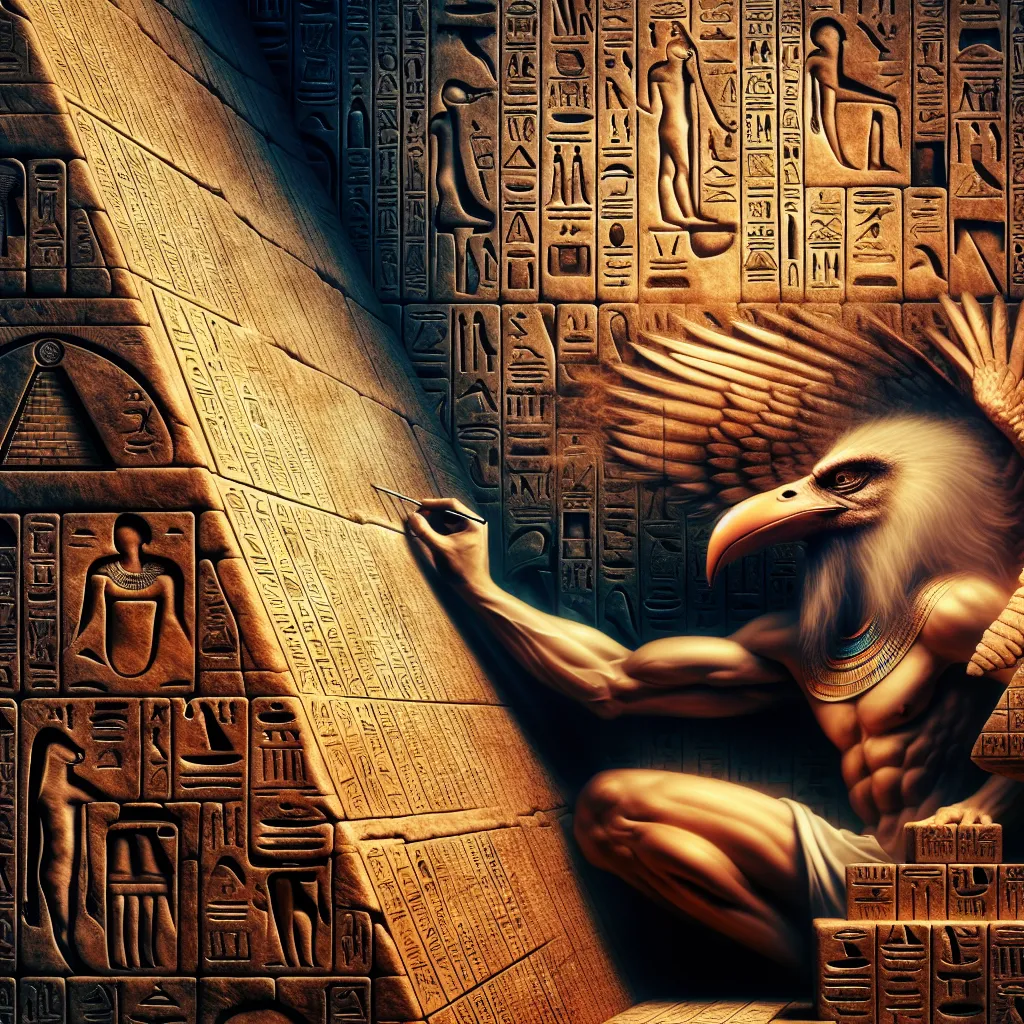
- Published on
- Authors

- Name
- You
Thoth and the Mysteries of the Pyramid Texts: Deciphering Ancient Wisdom
The ancient Egyptian civilization, with its awe-inspiring pyramids and complex hieroglyphics, has captured the imagination of scholars, mystics, and adventurers for centuries. At the heart of their enigmatic legacy lies Thoth, the deity revered as the god of wisdom, writing, magic, and the moon. Among the most profound reservoirs of esoteric knowledge are the Pyramid Texts, inscribed in the innermost sanctuaries of Egypt’s oldest pyramids. This article delves into the profound mysteries these texts hold and Thoths indispensable role in their preservation and conveyance.
Historical Context: The Pyramid Texts
The Pyramid Texts are the oldest known religious writings in the world, dating back to the Old Kingdom's Fifth and Sixth Dynasties (circa 2400-2300 BCE). These inscriptions were etched into the walls of pyramids at Saqqara, predominantly within the pyramids of Pharaoh Unas, Teti, and Pepi I and II. Although initially reserved for royal use, the overriding objective was to ensure safe passage and an afterlife for the deceased, providing potent incantations and hymns.
The Role of Thoth
Thoth, often depicted as a man with the head of an ibis or a baboon, epitomizes the epitome of learned wisdom and magical prowess. According to myth, Thoth authored the "Book of Thoth," a compendium of knowledge covering a wide array of subjects including astronomy, medicine, geography, and spirituality.
Thoths Domains:
| Attribute | Details |
|---|---|
| God of Wisdom | Possessed unparalleled knowledge, inventor of writing |
| Patron of Magicians | Protector of those who practice the mystical arts |
| Divine Scribe | Recorder of gods' deeds and human actions |
| Lunar Associations | Linked with cycles of time and the cosmos |
Mystical Wisdom Encoded in the Texts
The Pyramid Texts are not merely funerary spells; they are complex philosophical musings on existence, the cosmos, and the divine. Many verses are dialogues between the deceased and gods, with Thoth serving as a mediator and interpreter of divine will.
Sample of the Pyramid Texts (Utterance 665):
"O TMhw, who hath uttered a spell, 'Hail, son of Geb, after the state of weakness, there cometh youthful strength!' Let it be done thus for me, let me become young and strong, may I rise forth as a god."
Symbolism and Hermeticism
Thoths legacy transcends Egypt, influencing later esoteric traditions such as Hermeticism. The Emerald Tablet, attributed to Hermes Trismegistus (a syncretic combination of Thoth and the Greek god Hermes), encapsulates alchemical and spiritual principles that have permeated Western occultism.
Advanced Science Meets Mystical Wisdom
Modern science continually uncovers astonishing correlations between ancient texts and contemporary astronomical and mathematical knowledge. For instance, the precision of the Pyramid's alignment with the cardinal points, coupled with the sophisticated understanding of the precession of the equinoxes — aspects possibly rooted in wisdom conveyed by Thoth.
Comparative Table of Ancient Wisdom and Modern Science:
| Ancient Wisdom | Modern Correlation |
|---|---|
| Precession of Equinoxes | Calculated cycles known to ancient astronomers |
| Pyramid Construction | Knowledge of advanced geometry and engineering |
| Cosmic Cycles | Understanding cosmic patterns influencing Earth |
Conclusion: The Enduring Legacy of Thoth
Thoths embodiment of wisdom and his pivotal role in Egyptian religious texts underscore a timeless quest for knowledge and understanding. The Pyramid Texts, dense with esoteric significance, serve as a bridge between the physical and divine realms, a testament to humanity's ancient pursuit of the mysteries that govern existence.
As modern readers and seekers of wisdom explore these ancient carvings, Thoth continues to enlighten, guiding generations through the labyrinth of knowledge and enigmas set in stone millennia ago.
